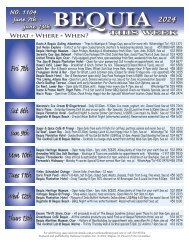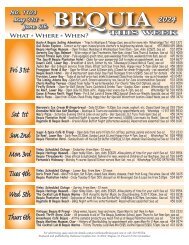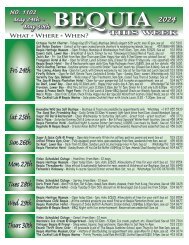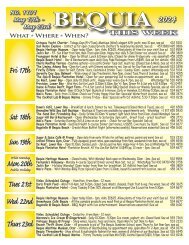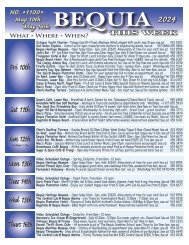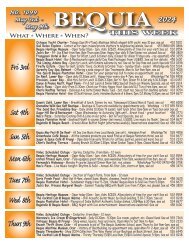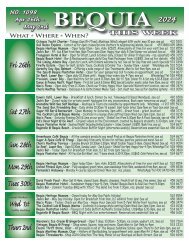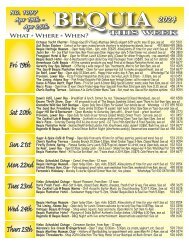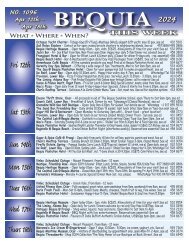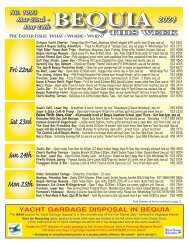Caribbean Compass Yachting Magazine - December 2020
Welcome to Caribbean Compass, the most widely-read boating publication in the Caribbean! THE MOST NEWS YOU CAN USE - feature articles on cruising destinations, regattas, environment, events...
Welcome to Caribbean Compass, the most widely-read boating publication in the Caribbean! THE MOST NEWS YOU CAN USE - feature articles on cruising destinations, regattas, environment, events...
You also want an ePaper? Increase the reach of your titles
YUMPU automatically turns print PDFs into web optimized ePapers that Google loves.
ON A<br />
SINGLE<br />
BREATH<br />
OF AIR<br />
by Lexi Fisher<br />
ALL PHOTOS: SCOTT WILKS<br />
bodies can sustain themselves for a surprisingly long time with the oxygen stored in<br />
its blood, tissues, and lungs. The current breath-hold world record, unassisted by<br />
breathing pure oxygen beforehand, is 12 minutes. When assisted by saturating the<br />
body through breathing pure oxygen, the record is an astonishing 22 minutes.<br />
The urge to breathe comes in waves, and manifests itself in subtly different ways<br />
for different people. In general, the first alarm bells ring after about 30 seconds, with<br />
your brain telling you to take a breath. It grows increasingly difficult to ignore and<br />
eventually the sensations in your body, signaling a buildup of carbon dioxide,<br />
become too uncomfortable to ignore.<br />
Luckily for freedivers, you can train your mind and body to withstand the<br />
discomfort of accumulating carbon dioxide. With practice, your body adapts to<br />
functioning with less oxygen, and your mind learns to quiet the alarm bells. In<br />
essence, you train yourself to become comfortable with the discomfort.<br />
For most people, after about a minute of telling your brain to “shut up, you’re not<br />
going to die,” the distress signals turn physical, sometimes with the urge to cough<br />
or swallow, feelings of warmness or tingling in your extremities, or tightness in your<br />
chest. Though different from person to person, the feeling of tightness in your chest<br />
is usually the build-up to diaphragm contractions, the frequency and onset of which<br />
also vary. Your diaphragm is a muscle, and it will contract involuntarily — your<br />
body’s attempt to trigger a breath. The strength of these contractions can range from<br />
a small flutter to a violent jolt, but are not necessarily a sign of hypoxia (dangerously<br />
low oxygen levels). Luckily, evolution has a trick up its sleeve in the form of the<br />
mammalian dive reflex (MDR).<br />
Found in all air-breathing vertebrates (which includes humans), but especially in<br />
aquatic mammals, MDR is the freediver’s ultimate biohack. Triggered when the nerve<br />
receptors around your nose and eyes are immersed in water while you hold your<br />
breath, the MDR overrides your body’s normal functioning to conserve oxygen in a<br />
number of ways. Your heart rate immediately begins to slow (as much as 50 percent);<br />
blood vessels in your extremities constrict, redirecting blood flow to your vital<br />
organs; the blood vessels around your lungs enlarge to facilitate greater gas<br />
exchange; and your spleen releases oxygen-rich red blood cells.<br />
More than anything, freediving is a sport of mental, not physical, control.<br />
Below: Tanks? No thanks. The sense of freedom that comes with being able<br />
to explore the ocean floor with nothing more than experience and willpower<br />
is therapeutic.<br />
This article is for entertainment purposes only and is not meant to<br />
replace professional training. Never freedive alone, and always consult a<br />
professional before any freedive or breath hold attempt.<br />
IT’S<br />
difficult to find a place in the <strong>Caribbean</strong> where there<br />
isn’t an opportunity to get in the water. Especially as<br />
sailors, our lives revolve around it. But what is it like<br />
to be so enchanted by the ocean that you willingly repress your natural<br />
urge to breathe in order to spend time underwater? This is the world<br />
of freediving.<br />
You are weightless, the sound of your heartbeat echoes though your<br />
ears. Time stands still, and the outside world seems an eternity away,<br />
like a dream. You are within yourself and outside yourself at the same<br />
time, floating through an alien world.<br />
Freediving is a world unto its own, the tranquility of which is almost<br />
impossible to describe. Practitioners often call it addictive. For those<br />
who have never experienced the thrill of descending into the depths on<br />
a single breath, freediving may seem like a frivolous death wish. It’s true<br />
that the risk is often part of the appeal, but it’s more than that. The<br />
sense of freedom that comes with being able to explore the ocean floor<br />
with nothing more than experience and willpower is therapeutic, as is<br />
the self-discipline and self-awareness it takes to overcome your mind’s<br />
natural inclination to panic during a breath-hold.<br />
One of my favorite things about freediving is that the less you do, the<br />
better you are. If you can quiet your mind, relax your body, move<br />
slower and with more intention, then you can stay longer, dive deeper,<br />
and go farther. Initially, this is counterintuitive — in most sports the<br />
faster you move the farther you go — but in freediving it’s all about oxygen<br />
conservation. In the underwater world, when you’re functioning on a single breath,<br />
any unnecessary movement or stress threatens your precious oxygen stores. It’s<br />
amazing how far you can go in the time between breaths, and what your body can<br />
do to get you there.<br />
More than anything, freediving is a sport of mental, not physical, control. Our<br />
evolutionary survival mechanisms are not easily ignored, and more often than not the<br />
psychological effects of a breath-hold are what will cause you to take a breath long<br />
before physically necessary. This is because, contrary to popular belief, lack of<br />
oxygen isn’t what causes the urge to breathe. Our urge to breathe is triggered instead<br />
by the buildup of carbon dioxide in our lungs and tissues. Our brain starts to<br />
generate distress signals after only a small increase in carbon dioxide levels, but our<br />
Basic physical training is worthwhile for increased flexibility and lung capacity. In<br />
addition, freedivers utilize a range of practices, both in and out of the water, to<br />
increase their breath-hold times. Practicing a series of breath holds with shorter and<br />
shorter breathing intervals (known as CO 2 tables) works on increasing your<br />
tolerance for carbon dioxide, while a series of longer and longer breath holds with a<br />
set breathing interval (known as O 2 tables) increases your tolerance for low oxygen<br />
levels. And you can learn to calm your mind and body through meditation, body<br />
scans, or mantras. Learning to tolerate and overcome the urge to breathe is one of<br />
the most empowering, and most dangerous, aspects of freediving.<br />
Most people understand that the greatest risk when freediving is drowning as a<br />
result of losing consciousness, commonly referred to as a blackout, but many people<br />
don’t understand the mechanisms behind the practices that most often lead to a<br />
blackout. A blackout is essentially your body’s “force quit” or “Ctrl+Alt+Delete”<br />
function. When your oxygen levels fall dangerously low, you lose consciousness in<br />
an effort to conserve enough oxygen to keep your brain and vital organs alive until<br />
breathing is resumed and oxygen levels are restored. Luckily, the urge to breathe,<br />
caused by rapidly rising carbon dioxide levels, usually gives you lots of notice.<br />
That is, unless you hyperventilated before your dive. Now highly discouraged,<br />
hyperventilation is the leading cause of freediving blackouts. Contrary to popular<br />
belief, hyperventilation doesn’t significantly increase the amount of oxygen in your<br />
body. Instead, it decreases the amount of carbon dioxide in your lungs and tissues.<br />
This delays your urge to breathe, and while this can extend your dive time, it can do<br />
so to such an extent that oxygen levels drop to dangerously low levels and you black<br />
out without any warning at all.<br />
Blackouts most often occur within the last third of an ascent, or on the surface<br />
before the oxygen from a diver’s first breath makes it to their brain. The diver will often<br />
let out a passive exhale and go limp. Their head drops and larynx closes to prevent<br />
water from entering the lungs (though it will eventually relax), unless the diver has<br />
kept their snorkel in, which can act as a funnel and flood the lungs with water.<br />
For this reason, safety is paramount. Never hyperventilate, never dive with your<br />
snorkel in your mouth, know your limits, and always, always dive with a buddy.<br />
DECEMBER <strong>2020</strong> CARIBBEAN COMPASS PAGE 19<br />
Lexi Fisher is a PADI Freediving Instructor, Open Water Scuba Instructor, and<br />
co-author of the Cruising Guides to the Windward and Leeward Islands. She teaches<br />
in Carriacou through her day charter business Incognito Adventures (www.<br />
incognitoadventures.com).<br />
Other freediving centers in the <strong>Caribbean</strong> can be found in Aruba (Happy Divers),<br />
Barbados (Barbados Blue, G Fish Watersports, Trident Freediver, Freediving<br />
Barbados), Bonaire (Deepsea Freediving, Bonaire Freediving School), Curaçao<br />
(B Diving, Coral Divers), Dominica (Blue Element), and Grenada (Eco Dive).






